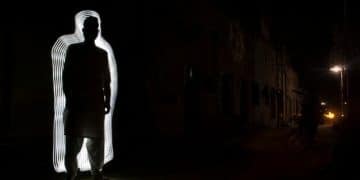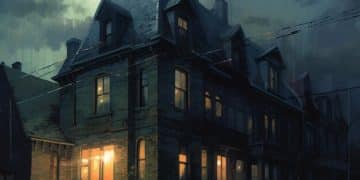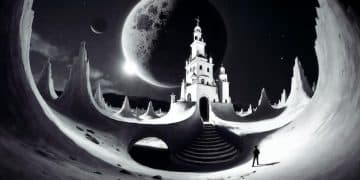Unveiling Literary Horror Beyond Jump Scares: Psychological and Existential Depths
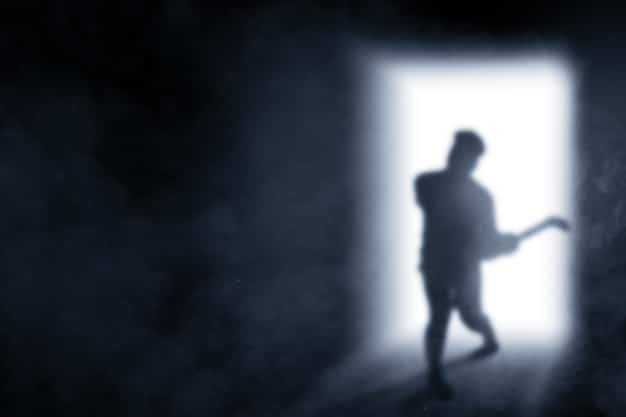
Literary Horror Beyond Jump Scares: Exploring Psychological and Existential Themes delves into the genre’s profound capacity to explore the human condition, moving past simple frights to tackle existential dread, psychological complexities, and the unsettling realities of our inner selves.
Horror often gets a bad rap for being all about cheap thrills and sudden scares. But what happens when horror transcends the jump scares and delves into the deeper, more unsettling aspects of the human psyche? Literary Horror Beyond Jump Scares: Exploring Psychological and Existential Themes offers a rich tapestry of narratives that burrow under your skin and stay with you long after you’ve finished reading.
We’re not just talking about ghosts and monsters here. This is about confronting the darkness within, grappling with the meaning of existence, and exploring the fragility of the human mind. Let’s unpack why literary horror resonates so deeply.
What Defines Literary Horror and Its Appeal
Literary horror is a subgenre that prioritizes psychological depth, thematic complexity, and sophisticated writing over mere shock value. It seeks to disturb not just with fear, but with introspection and a lingering sense of unease.
Unlike its more visceral counterparts, literary horror lingers in the mind, prompting reflection on uncomfortable truths about ourselves and the world we inhabit.
The Hallmarks of Literary Horror
Several elements distinguish literary horror from other types of horror fiction.
- Psychological Depth: Characters are complex and often deeply flawed, battling internal demons that mirror the external horrors they face.
- Thematic Resonance: Stories explore profound themes like isolation, mortality, identity, and the nature of evil.
- Atmospheric Tension: A focus on creating a pervasive sense of dread and anticipation through vivid imagery and subtle cues.
- Ambiguity and Interpretation: Open endings and unresolved questions that invite readers to engage actively and draw their own conclusions.
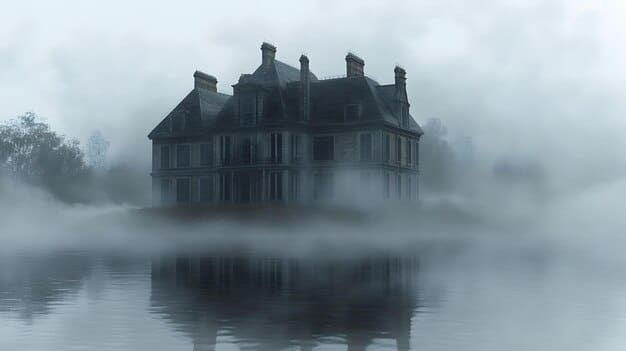
In essence, literary horror leverages fear to explore the darker recesses of the human experience, prompting us to confront what we often prefer to ignore.
Exploring Psychological Themes in Literary Horror
At its heart, literary horror is deeply concerned with the human mind. It explores the ways in which our thoughts, fears, and traumas can shape our reality.
By examining our psychological vulnerabilities, these stories offer a mirror to our own anxieties and insecurities.
The Unreliable Narrator
A common trope in literary horror is the unreliable narrator, a character whose perception of events is distorted or compromised. This technique can create a sense of unease and uncertainty, blurring the line between reality and delusion.
Think of novels like “The Turn of the Screw” by Henry James, where the governess’s sanity is constantly questioned, leaving the reader to wonder if the ghosts are real or imagined.
Madness and Obsession
The exploration of madness and obsession is another significant theme in literary horror. Characters driven to the brink of sanity by grief, trauma, or supernatural forces offer a chilling glimpse into the fragility of the human mind.
Stories like “The Tell-Tale Heart” by Edgar Allan Poe showcase the horrifying consequences of unchecked obsession and descent into madness.
Literary horror uses these psychological themes to tap into our deepest fears and insecurities, creating a visceral and lasting impact.
Existential Themes: Grappling with the Meaning of Existence
Beyond the psychological, literary horror often grapples with existential questions about the nature of existence, mortality, and our place in the universe.
It’s in these explorations that the genre truly transcends simple scares and offers profound insights into the human condition. Literary Horror Beyond Jump Scares: Exploring Psychological and Existential Themes provides fertile ground for examining these complex ideas.
The Absurdity of Existence
Many literary horror stories explore the idea that life is inherently meaningless and absurd. This can manifest in encounters with cosmic entities, indifferent universes, or the realization that our actions have no lasting significance.
Authors like H.P. Lovecraft embraced this theme, portraying humanity as insignificant beings dwarfed by ancient, unknowable forces.
Confronting Mortality
Horror, at its core, is often about confronting our own mortality. Literary horror takes this a step further, exploring the anxieties and fears surrounding death in a more nuanced and introspective way.
Stories may delve into the grieving process, the fear of oblivion, or the possibility of an afterlife, prompting readers to contemplate their own inevitable demise.
By confronting these fundamental questions, literary horror invites us to reflect on our values, our priorities, and what truly matters in our lives.

Examples of Literary Horror Masterpieces
To truly appreciate the depth and breadth of literary horror, it’s essential to explore some of its most iconic examples.
These works demonstrate the power of the genre to blend fear with intellectual and emotional resonance.
“Frankenstein” by Mary Shelley (1818)
A cornerstone of both science fiction and horror, “Frankenstein” explores themes of creation, responsibility, and the dangers of unchecked ambition. This novel delves into the psychological torment of both Victor Frankenstein and his creature, raising profound questions about what it means to be human. “Frankenstein” illustrates Literary Horror Beyond Jump Scares: Exploring Psychological and Existential Themes through its exploration of the consequences of playing God.
“The Haunting of Hill House” by Shirley Jackson (1959)
A masterclass in atmospheric horror, “The Haunting of Hill House” relies more on psychological tension than overt scares. The story follows a group of paranormal investigators who descend into madness as they explore a notoriously haunted house.
Jackson masterfully portrays the disintegration of her characters’ minds, blurring the line between the supernatural and the psychological.
“Beloved” by Toni Morrison (1987)
While not strictly a horror novel, “Beloved” incorporates elements of the genre to explore the trauma of slavery and its lingering effects on the human psyche. The story centers on Sethe, a former slave haunted by the ghost of her baby daughter. Morrison’s prose is as haunting as the themes she explores, solidifying “Beloved” as a significant contribution to literary horror.
These examples showcase the diverse range of themes and styles within literary horror, demonstrating its enduring power to captivate and disturb.
The Enduring Legacy of Literary Horror
Literary horror is more than just a source of entertainment; it’s a powerful tool for exploring the human condition.
Its enduring legacy lies in its ability to challenge our perceptions, confront our fears, and provoke profound introspection.
Challenging Societal Norms
Literary horror often pushes the boundaries of what is considered acceptable or normal. By exploring taboo subjects like death, madness, and the dark side of human nature, these stories challenge societal norms and force us to confront uncomfortable truths.
Providing Catharsis
For some readers, literary horror can provide a cathartic release. By vicariously experiencing fear and dread through the characters in a story, we can confront our own anxieties and find a sense of closure or understanding.
- Confronting Mortality: Stories about death and the afterlife can help us come to terms with our own mortality.
- Exploring Trauma: Narratives about trauma and abuse can provide a safe space to process difficult emotions.
- Questioning Reality: Tales of madness and delusion can challenge our assumptions about the nature of reality.
In conclusion, literary horror continues to evolve and adapt, remaining a relevant and important genre for exploring the complexities of the human experience.
| Key Point | Brief Description |
|---|---|
| 🤔 Psychological Depth | Explores intricate character minds facing inner demons. |
| 💀 Existential Themes | Deals with mortality, meaninglessness, and the absurd. |
| 📜 Literary Writing | Focuses on atmosphere, subtlety, and reader engagement. |
| 👻 Enduring Legacy | Challenges norms, provides catharsis, and explores humanity. |
Frequently Asked Questions
Literary horror focuses on psychological depth and thematic complexity over simple scares. It often explores existential themes and relies on atmosphere and suggestion rather than explicit violence.
Common themes include isolation, madness, the unreliable narrator, existential dread, confronting mortality, and the exploration of trauma and societal taboos.
It’s compelling because it delves into the darker aspects of the human experience, forcing us to confront our deepest fears and anxieties in a thoughtful and introspective way. Literary Horror Beyond Jump Scares: Exploring Psychological and Existential Themes is a truly profound exploration.
While they may not rely on jump scares, literary horror stories can be deeply unsettling and psychologically disturbing. The fear comes from within, tapping into our subconscious anxieties.
It challenges our perceptions of reality, explores our vulnerabilities, and prompts us to reflect on the meaning of existence. This exploration can lead to greater self-awareness and empathy.
Conclusion
Literary Horror Beyond Jump Scares: Exploring Psychological and Existential Themes offers a much richer and more rewarding experience than traditional horror. By delving into the complexities of the human mind and our place in the universe, it provides a profound and lasting impact.
So, the next time you’re looking for a truly unsettling read, consider venturing beyond the jump scares and discovering the depths of literary horror. You might be surprised by what you find.
